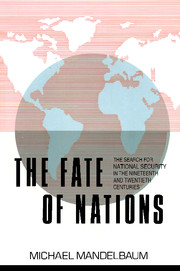Book contents
- Frontmatter
- Contents
- Acknowledgments
- A Note on Sources and Citations
- Introduction
- 1 Collective Approaches to Security: The Nineteenth-Century Managed Balance of Power System and Great Britain
- 2 France, 1919–1940: The Failure of Security Policy
- 3 The United States, 1945–1980: The Natural History of a Great Power
- 4 China, 1949–1976: The Strategies of Weakness
- 5 Israel, 1948–1979: The Hard Choices of the Security Dilemma
- 6 Collective Approaches: The International Economic Order and Japan, 1945–1985
- Index
Introduction
Published online by Cambridge University Press: 20 May 2010
- Frontmatter
- Contents
- Acknowledgments
- A Note on Sources and Citations
- Introduction
- 1 Collective Approaches to Security: The Nineteenth-Century Managed Balance of Power System and Great Britain
- 2 France, 1919–1940: The Failure of Security Policy
- 3 The United States, 1945–1980: The Natural History of a Great Power
- 4 China, 1949–1976: The Strategies of Weakness
- 5 Israel, 1948–1979: The Hard Choices of the Security Dilemma
- 6 Collective Approaches: The International Economic Order and Japan, 1945–1985
- Index
Summary
The subject of this book is the impact of the international system on the sovereign states that comprise it. It is the fate of every independent nation to have to protect itself against the possibility of external attack, because there is no supreme international authority to protect all states as government protects individuals within states. But the fate of every state is not the same; the problem of national security, and thus the policies that address it, take several basic forms. One of this book's two main purposes is to identify and illustrate the basic varieties of security policy. They are created by variations of the international system itself. The six chapters that make up the book illustrate one or another of these basic varieties. The book's second purpose is to reinterpret a number of well-documented and extensively analyzed historical episodes in order to show that they were responses by particular states to the demands and constraints of the international system. The aim is to demonstrate the ways in which security policies were shaped by the character of the international system and by the positions of particular states within it.
The international system varies in two fundamental ways. One involves its organizing principle, which is anarchy in the literal sense of the term, meaning the absence of formal organs of government, rather than chaos. It is anarchy that creates the insecurity that is the fate of every country.
- Type
- Chapter
- Information
- The Fate of NationsThe Search for National Security in the Nineteenth and Twentieth Centuries, pp. 1 - 7Publisher: Cambridge University PressPrint publication year: 1988
- 1
- Cited by



